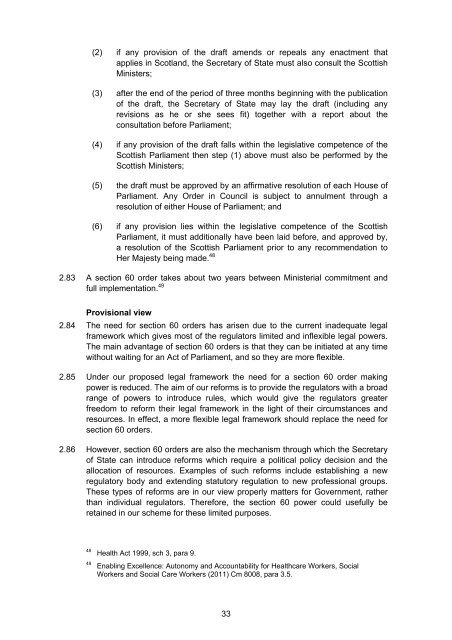Regulation of Health and Social Care Professionals Consultation
Regulation of Health and Social Care Professionals Consultation
Regulation of Health and Social Care Professionals Consultation
You also want an ePaper? Increase the reach of your titles
YUMPU automatically turns print PDFs into web optimized ePapers that Google loves.
(2) if any provision <strong>of</strong> the draft amends or repeals any enactment that<br />
applies in Scotl<strong>and</strong>, the Secretary <strong>of</strong> State must also consult the Scottish<br />
Ministers;<br />
(3) after the end <strong>of</strong> the period <strong>of</strong> three months beginning with the publication<br />
<strong>of</strong> the draft, the Secretary <strong>of</strong> State may lay the draft (including any<br />
revisions as he or she sees fit) together with a report about the<br />
consultation before Parliament;<br />
(4) if any provision <strong>of</strong> the draft falls within the legislative competence <strong>of</strong> the<br />
Scottish Parliament then step (1) above must also be performed by the<br />
Scottish Ministers;<br />
(5) the draft must be approved by an affirmative resolution <strong>of</strong> each House <strong>of</strong><br />
Parliament. Any Order in Council is subject to annulment through a<br />
resolution <strong>of</strong> either House <strong>of</strong> Parliament; <strong>and</strong><br />
(6) if any provision lies within the legislative competence <strong>of</strong> the Scottish<br />
Parliament, it must additionally have been laid before, <strong>and</strong> approved by,<br />
a resolution <strong>of</strong> the Scottish Parliament prior to any recommendation to<br />
Her Majesty being made. 48<br />
2.83 A section 60 order takes about two years between Ministerial commitment <strong>and</strong><br />
full implementation. 49<br />
Provisional view<br />
2.84 The need for section 60 orders has arisen due to the current inadequate legal<br />
framework which gives most <strong>of</strong> the regulators limited <strong>and</strong> inflexible legal powers.<br />
The main advantage <strong>of</strong> section 60 orders is that they can be initiated at any time<br />
without waiting for an Act <strong>of</strong> Parliament, <strong>and</strong> so they are more flexible.<br />
2.85 Under our proposed legal framework the need for a section 60 order making<br />
power is reduced. The aim <strong>of</strong> our reforms is to provide the regulators with a broad<br />
range <strong>of</strong> powers to introduce rules, which would give the regulators greater<br />
freedom to reform their legal framework in the light <strong>of</strong> their circumstances <strong>and</strong><br />
resources. In effect, a more flexible legal framework should replace the need for<br />
section 60 orders.<br />
2.86 However, section 60 orders are also the mechanism through which the Secretary<br />
<strong>of</strong> State can introduce reforms which require a political policy decision <strong>and</strong> the<br />
allocation <strong>of</strong> resources. Examples <strong>of</strong> such reforms include establishing a new<br />
regulatory body <strong>and</strong> extending statutory regulation to new pr<strong>of</strong>essional groups.<br />
These types <strong>of</strong> reforms are in our view properly matters for Government, rather<br />
than individual regulators. Therefore, the section 60 power could usefully be<br />
retained in our scheme for these limited purposes.<br />
48 <strong>Health</strong> Act 1999, sch 3, para 9.<br />
49 Enabling Excellence: Autonomy <strong>and</strong> Accountability for <strong>Health</strong>care Workers, <strong>Social</strong><br />
Workers <strong>and</strong> <strong>Social</strong> <strong>Care</strong> Workers (2011) Cm 8008, para 3.5.<br />
33
















